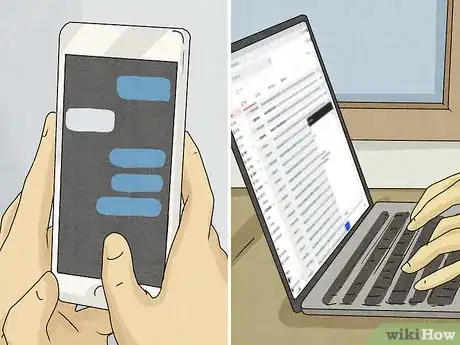This article was co-authored by Tala Johartchi, PsyD and by wikiHow staff writer, Aly Rusciano. Dr. Tala Johartchi is a Clinical Psychologist based in the Los Angeles, California metro area. With expertise and advanced training in Evidence-Based Practices and therapeutic/behavioral frameworks, Dr. Johartchi specializes in working with individuals, couples, and families experiencing Substance Disorders, Love Addiction and Codependency, Post Traumatic Stress Disorder, as well as common co-occurring disorders such as Depression, Anxiety, and Relational/Attachment difficulties. She earned an MA and PsyD in Clinical Psychology from The American School of Professional Psychology at Argosy University, San Francisco.
There are 10 references cited in this article, which can be found at the bottom of the page.
This article has been viewed 29,358 times.
Looking to outsmart, expose, and counteract your gaslighter? Gaslighting can leave you physically and mentally exhausted. There’s no question as to why you may want revenge on your gaslighter. After all, they’ve manipulated you and made you question your worth, identity, and truths. In this article, we’ll teach you how to turn the tables on a gaslighter and rewrite your narrative. They’ve had control over you for long enough, and now it’s time to beat them at their own game.
Things You Should Know
- Listen to and question a gaslighter’s reasoning to catch them in a web of lies.
- Confront a gaslighter calmly and rationally to avoid retaliation and flip the script.
- Collect proof, establish boundaries, and gather support to outsmart a gaslighter at their own game.
Steps
Ignore their tactics.
-
Let a gaslighter’s lies go in one ear and out the other to outsmart them. Ultimately, gaslighters want attention and control. They’ll spin lies and microaggressions to make you doubt yourself.[1] X Research source One of the best ways to turn the tables on a gaslighter is to simply not listen to or engage with them. When they start gaslighting you, shrug and walk away or think about something else.
- Consider deleting or blocking their number so they can’t reach you.
Establish boundaries with them.
-
Draw a line the gaslighter can't cross without consequences. You’re not to blame for a gaslighter’s behavior, and you can stick up for yourself (as long as you feel safe to do so).[2] X Research source Set clear boundaries with them and/or yourself if you’re on the fence about leaving them. Take back control by honoring that if they cross even the smallest boundary, you’re leaving.[3] X Research source
- For example, you may set a boundary that if the gaslighter tells you you’re “too sensitive” one more time, you’ll end the relationship.
- Write down your boundaries to easily remind yourself of them.
- Do your best not to ignore when your boundaries are crossed. They may try to turn your boundaries against you, but remember that you are strong and capable no matter what they say.
Collect proof of their behavior.
-
Save all your receipts to catch a gaslighter in their lies. Taking notes, saving texts, and screenshotting online interactions can help you identify and confront your gaslighter. If you believe they’re lying about something, look back in your notes or receipts for a real-time record of where they went wrong. This can help you feel more sane and secure your beliefs—stopping their control in its tracks.[4] X Trustworthy Source Harvard Business Review Online and print journal covering topics related to business management practices Go to source
- Store your receipts in a passcode-locked file on your computer or a secret flash drive.
- Keep your proof even after resolving issues or leaving the gaslighter, as they may be able to help you in future situations such as a legal case.
Keep track of the lies they tell.
-
Strategize your next move by listening to a gaslighter. A great way to turn the tables on a gaslight is to make note of their lies. Write down the conversations with them that feel off, so you can look at them objectively.[5] X Research source Think of it like collecting inventory—you’re sifting through their lies and deception to find something you might be able to use against them. Plus, you’re securing your own reasoning in the process.
- Gaslighting and manipulation can be hard to decipher at first, so pay close attention to what they say and do.[6] X Research source
Ask them to explain their reasoning.
-
Outsmart a gaslighter by questioning them. Gaslighters will lie about things you know are true and accuse you of being in the wrong. Clap back at a gaslighter by gently asking them why they feel this way. More often than not, they’ll get flustered and might not be able to fully explain themselves.[7] X Research source
- Kill a gaslighter with kindness when questioning them. In other words, avoid being aggressive or accusatory, as this could cause them to retaliate and conjure up more stories.
- Try saying something like, “You say this didn’t happen, but I have a video of it. I don’t understand. Can you please clarify?”
Point out their lies.
-
Expose a gaslighter by catching them in a lie. Gaslighters will try to justify their lies in an attempt to alter your perception. They can even make you question your sanity. If their reasoning seems off or doesn’t make sense, speak up and say what you believe is true (as long as you feel comfortable enough to do so). Catching them in a lie can be enough to cause them to stumble.[8] X Trustworthy Source Harvard Business Review Online and print journal covering topics related to business management practices Go to source
- Go into your confrontation with a game plan. Be prepared with specific points, notes, and/or proof.
Hide your emotions.
-
Destroy a gaslighter at their own game by appearing emotionless. Gaslighters want to get a reaction from you—it’s why they constantly push buttons and spin lies. One of the best things you can do to turn the tables on them is simply appearing unbothered. When they lie, try shrugging it off or saying, “Okay.” Then, take a step back as ask yourself how their comment made you feel. Focusing on your emotions inwardly can help you acknowledge a gaslighter’s tactics.[9] X Research source
- Try not to focus on who’s right and wrong. Instead, concentrate on what and how you feel when being gaslit.
Keep things civil.
-
Remain stoic so a gaslighter can’t put the blame on you. Avoid debates and arguments with a gaslighter when you can. Gaslighters can quickly retaliate and escalate a practical debate if they feel like they’re in the wrong. They’re more likely to blame you when this happens. But you can outsmart them by keeping the conversation steady and civil.[10] X Research source
- Remember, you are in control of your opinion, not someone else.
Use a calm and even tone when communicating.
-
Counteract a gaslighter’s hostility with pleasantries. Try not to get defensive when talking to them. Instead, focus on ambiguous statements and having a calm demeanor. Avoid yelling, screaming, or pointing blame. This gives the gaslighter less of a chance to act like the victim or make you look bad.[11] X Research source
- Try responses like, “Really?” and “I’m confused.”
Avoid falling for their “love bombing” tactics.
-
Don't let them reel you back in to stop a gaslighter in their tracks. Gaslighters often use a tactic called “love bombing” to manipulate their victims after starting an argument. They’ll shower you with praise, affection, and appreciation, making you more likely to fall for their tricks. Knowing the signs of gaslighting can help you turn the tables as you’ll be able to see through their lies.[12] X Research source
- For example, a gaslighter may compliment you but then say something that makes you doubt yourself within the same breath.
- Falling for a gaslighter’s tactics is easy, so don’t beat yourself up about it! They’re master manipulators, but you’re even stronger for uncovering their schemes.
Gather a support system.
-
Turn the tables on a gaslighter by surrounding yourself with others. A gaslighter wants you to feel alone and isolated. They may spin lies about your friends and family to make you second guess their actions. Instead of losing touch with those you love, reach out to them. Call your mom, video chat with a friend, or start a group message with your immediate family. By keeping your loved ones close, despite what the gaslighter says, you’re ignoring their mind games.[13] X Research source
- Talk to your support system about what’s happening so everyone is fully aware of the situation.
- Establish a text code or phrase you can message or say to someone in your support system if you’re in trouble and need help right away.
Stay true to yourself.
-
Hold a gaslighter accountable by being confident. A gaslighter’s main goal is to have control over their victim. If you start to question or confront their manipulative behavior, they might try to paint themselves as the victim so they can avoid responsibility. Remind yourself of your facts and truths. Holding firm in your beliefs and recognizing their lies will turn their game upside down.[14] X Research source
- Use positive affirmations to remind yourself of your worth.
- Whisper the truth to yourself or write it down in a journal.
Be empathetic towards them.
-
Understand that a gaslighter may be projecting their insecurities onto you. A gaslighter may be manipulating you without even realizing they’re doing so. Their lack of self-awareness may stem from childhood trauma or being gaslit themselves. Although a gaslighter’s behavior isn’t acceptable in any circumstance, it’s important to acknowledge that they may be hurting on the inside.[15] X Research source
- Ignorance isn’t an excuse for manipulative behavior. If a gaslighter continues to manipulate even after becoming aware of their actions, they’re not to be trusted.
Walk away or end the relationship.
-
Rewrite the narrative of your story to turn the tables on a gaslighter. Gaslighters want to keep a hold of their victims and hold them captive, but you have the power to say “no.” If you no longer feel safe, loved, or appreciated, walk away from the friendship, partnership, or job. Your happiness isn’t worth their time and energy.[16] X Research source
- Leaving an abusive relationship isn’t easy, so make sure you prepare as best as you can and seek support from someone you trust.
Talk to a therapist.
-
Confide in a therapist to take back control. Being manipulated by a gaslighter can leave you emotionally and physically exhausted. After you’ve walked away or left a gaslighter, the best thing you can do for yourself is ask for help. Talking to a therapist can help you heal from a gaslighter and feel more confident in yourself—allowing you to turn the tables by taking back control of your life.[17] X Research source
- Online services like BetterHelp and TalkSpace provide one-on-one virtual counseling that’s only a click away.
- Call local therapists to see if they take your insurance.
- If you’re in school, you may be able to talk to a school counselor for free.
- The National Domestic Violence Hotline (1.800.799.7233) offers help and support to those gaslit by partners or family members.[18] X Research source
You Might Also Like
 What to Do If Someone Is Blackmailing You: How to Stop a Blackmailer
What to Do If Someone Is Blackmailing You: How to Stop a Blackmailer








 How to Deal with Mind Games: Effective Ways to End Manipulation
How to Deal with Mind Games: Effective Ways to End Manipulation




References
- ↑ https://www.researchgate.net/publication/327944201_Gaslighting_and_the_knot_theory_of_mind
- ↑ https://www.psychologytoday.com/us/blog/widows-guide-healing/202206/7-things-everyone-should-understand-about-gaslighting
- ↑ https://www.psychologytoday.com/us/blog/here-there-and-everywhere/201904/when-is-relationship-bad-enough-leaving-gaslighter
- ↑ https://hbr.org/2020/11/ask-an-expert-what-should-i-do-if-my-boss-is-gaslighting-me
- ↑ https://www.vox.com/first-person/2018/12/19/18140830/gaslighting-relationships-politics-explained
- ↑ https://www.psychologytoday.com/us/basics/gaslighting
- ↑ https://www.psychologytoday.com/us/blog/the-mindful-self-express/202106/5-go-tactics-gaslighters-and-how-resist-them
- ↑ https://hbr.org/2020/11/ask-an-expert-what-should-i-do-if-my-boss-is-gaslighting-me
- ↑ https://psychcentral.com/blog/how-to-identify-and-deal-with-gaslighting#how-to-deal-with-gaslighting
- ↑ https://www.vox.com/first-person/2018/12/19/18140830/gaslighting-relationships-politics-explained
- ↑ https://www.psychologytoday.com/us/blog/the-mindful-self-express/202106/5-go-tactics-gaslighters-and-how-resist-them
- ↑ https://www.psychologytoday.com/us/basics/gaslighting
- ↑ https://sunbehavioral.com/kentucky/what-is-gaslighting/
- ↑ https://www.psychologytoday.com/us/basics/gaslighting
- ↑ https://www.psychologytoday.com/us/basics/gaslighting
- ↑ https://sunbehavioral.com/kentucky/what-is-gaslighting/
- ↑ https://www.psychologytoday.com/us/blog/widows-guide-healing/202206/7-things-everyone-should-understand-about-gaslighting
- ↑ https://www.forbes.com/health/mind/what-is-gaslighting/
About This Article





























































